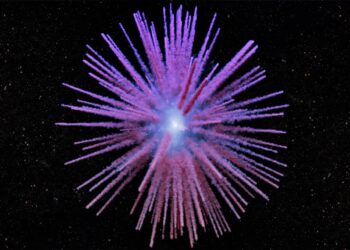acronym: A word made by combining some of the starting letter or groups of letters from a number of words. For instance, STEM is an acronym for Science, Technology, Engineering and Math. Radar is an acronym for RAdio Detection And Ranging. Even laser is an acronym for Light Amplification by Stimulated Emission of Radiation.
amateur: One who engages in a pursuit as a pastime, not as a profession.
atmosphere: The envelope of gases surrounding Earth, another planet or a moon.
atom: The basic unit of a chemical element. Atoms are made up of a dense nucleus that contains positively charged protons and uncharged neutrons. The nucleus is orbited by a cloud of negatively charged electrons.
aurora: A light display in the sky caused when incoming energetic particles from the sun collide with gas molecules in a planet’s upper atmosphere. The best known of these is Earth’s aurora borealis, or northern lights. On some outer gas planets, like Jupiter and Saturn, the combination of a fast rate of rotation and strong magnetic field leads to high electrical currents in the upper atmosphere, above the planets’ poles. This, too, can cause auroral “light” shows in their upper atmosphere.
citizen scientists: Public volunteers — people of all ages and abilities — who participate in research. The data that these citizen “scientists” collect helps to advance research. Letting the public participate means that science can get data from many more people and places than would be available if they were being collected by trained scientists alone.
colleague: Someone who works with another; a co-worker or team member.
computer model: A program that runs on a computer that creates a model, or simulation, of a real-world feature, phenomenon or event.
data: Facts and/or statistics collected together for analysis but not necessarily organized in a way that gives them meaning. For digital information (the type stored by computers), those data typically are numbers stored in a…
Read the full article here







